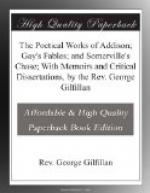“She was known to every star,
And every wind that blows.”
Poor Dick was known to every sponging-house, and to every bailiff that, blowing in pursuit, walked the London streets. A fine-hearted, warm-blooded character, without an atom of prudence, self-control, reticence, or forethought; quite as destitute of malice or envy; perpetually sinning and perpetually repenting; never positively irreligious, even when drunk; and often excessively pious when recovering sobriety,—Steele reeled his way through life, and died with the reputation of being an orthodox Christian and a (nearly) habitual drunkard; the most affectionate and most faithless of husbands; a brave soldier, and in many points an arrant fool; a violent politician, and the best natured of men; a writer extremely lively, for this, among other reasons, that he wrote generally on his legs, flying or meditating flight from his creditors; and who embodied in himself the titles of his three principal works—“The Christian Hero,” “The Tender Husband,” and the Tatler;—being a “Christian Hero” in intention, one of those intentions with which a certain place is paved; a “Tender Husband,” if not a true one, to his two ladies; and a Tatler to all persons, in all circumstances, and at all times. When Addison first knew this original, he was probably uncontaminated, and must have been, as he continued to the end to be, an irascible but joyous and genial being; and they became intimate at once, although circumstances severed them from each other for a long period.
In 1687 Addison entered Queen’s College, Oxford; but sometime after, (Macaulay says “not many months,” Johnson “a year,” and Miss Aiken “two years,”) Dr Lancaster, of Magdalene College, having accidentally seen some Latin verses from his pen, exerted himself to procure their author admission to the benefits of a foundation, then the wealthiest in Europe. Our poet was first elected Demy, then Probationary Fellow in 1697, and in the year following, Actual Fellow. During the ten years he resided at Oxford, he was a general favourite, remarkable for his diligence in study, for the purity




